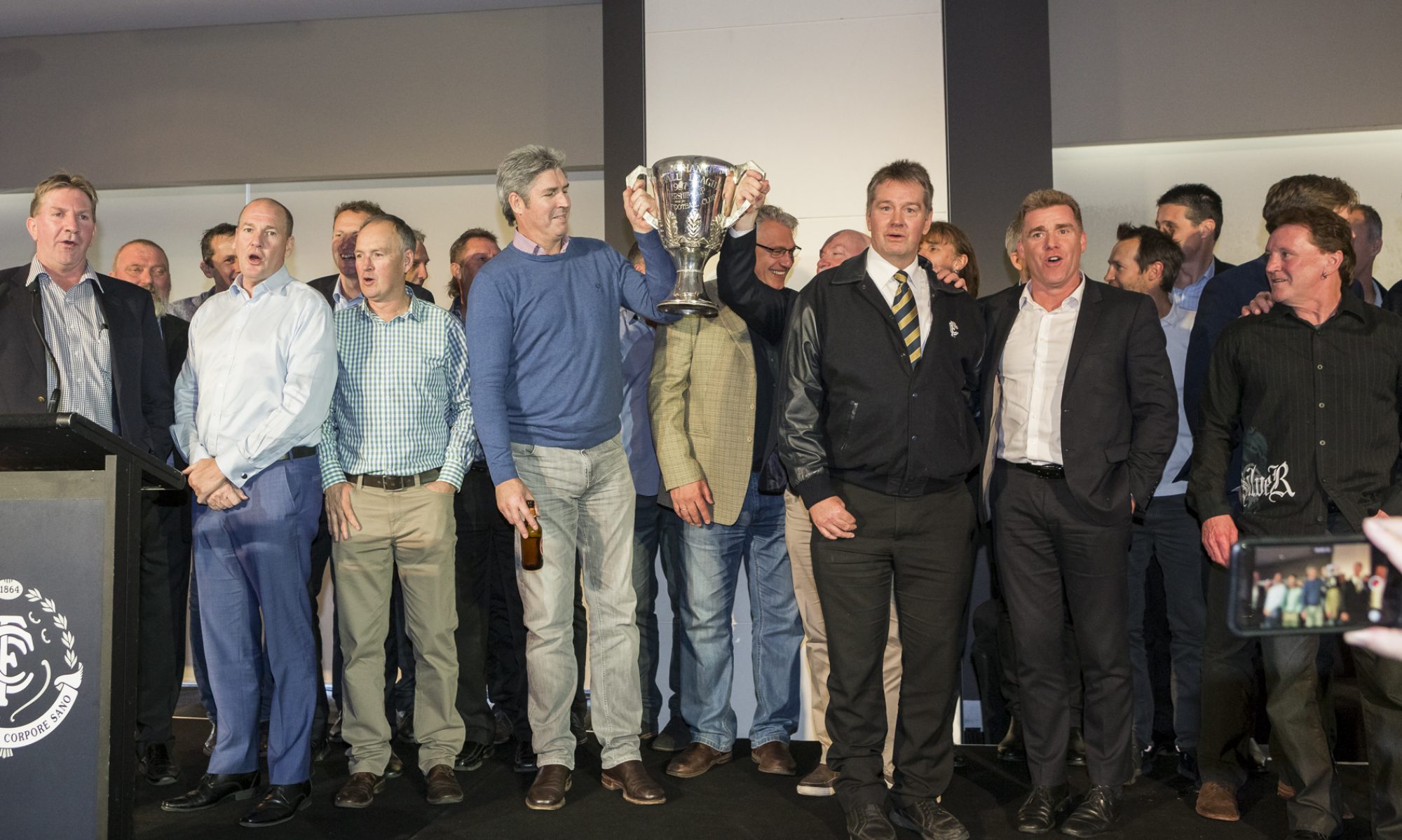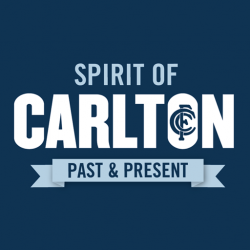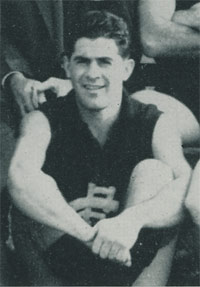By Tony De Bolfo

He stood just five feet three, but there was a lot of dirt in Tommy Downs . . . and while his time at Carlton only took in 56 games, few before or since can lay claim to causing greater controversy.
Born in inner city Fitzroy in 1901, Tommy cut his teeth – quite literally we suspect – at Preston in the rough and tumble of the VFA. These were the immediate years post-World War I, and took Tommy through to 1921 when he joined neighbouring club Northcote.
At Northcote, Tommy won a handsome reputation as a footballer, earning what was then known as the Recorder Cup for competition Best and Fairest player in 1925. In time, Tommy attracted the interest of Carlton’s talent scouts and by early 1927, when the first market tremors hit the United States’ financial markets, he resolved to make a go of it at Princes Park.
At Carlton, Tommy followed in the footsteps of his late cousin Lyle Downs, a more tragic figure there never was. In July 1921, Lyle, then 24, had collapsed and died of a heart attack in the change rooms after being party to an innocuous Thursday evening training session at the old Carlton ground.
It’s fair and reasonable to assume that Tommy’s time at Carlton through the 1927-’29, ’31 and ’33 would have landed him more than his game quota of 56 had he not been suspended for a total of 60 games in all (which is precisely 38 more than our very own David Rhys-Jones).
In all, Tommy had his number taken three times on a total of four charges, and clearly he reserved much of his fire and brimstone for Richmond. On the first occasion, in the 1928 semi-final against the Tigers, he was booked and duly rubbed out for 12 games for striking Jack Fincher (and Richmond’s Allan Geddes copped eight for biffing Tommy).
In the wake of the 1929 Preliminary Final, Tommy was also found guilty on two charges; one of striking, and the other of elbowing Richmond’s Don Harris. With the VFL judiciary under intense pressure to clean up the game, Tommy was used as the scapegoat and copped a whopping 19-game suspension for his troubles.
Then came the ill-fated return match against Richmond at Punt Road Oval in July, when Richmond’s captain Maurie Hunter reeled out a pack, and the field umpire reached for his book.
Found guilty of the worst crime in football – kicking – Tommy was suspended for 29 games, which ruled him out of the remainder of 1931, and all of 1932. But both player and club were united in their belief that Tommy was innocent of the charge, and that he had been convicted on his record rather than the evidence.
Support for Tommy in Carlton town was vociferous. In September of ’31, more than 1000 supporters converged on Princes Park to debate the case and lend morale backing to their beloved Blue. It was reported that at times the then President Dave Crone had difficulty controlling the mob, as devotees criticised the then VFL for failing to quash the verdict and contributed funds to support Downs’
A meeting of Carlton members was also called to protest the decision, and a crowd of around 2000 packed Brunswick Town Hall. Tommy’s case was taken up by Robert Menzies, QC (later Sir Robert, Prime Minister of Australia and Carlton’s No.1 ticketholder). Regrettably there was no avenue of appeal in place at that time, so Tommy and the club were forced to pay a very high price for what turned out to be an umpire’s mistake.

Tommy Downs and his golfing friends enjoy a well-deserved drink.
Some years later, The Sporting Globe published a photograph taken by a Richmond spectator at the match, which clearly showed that it was not Downs who had made contact with Hunter, but a teammate who had accidentally laid boot on the Tigers’ front man.
Despite the massive backlash, Tommy quietly served out his suspension, and came back to play again at Carlton in 1933. By then 32, he managed six games and six goals before retiring for good.
Tommy Downs died at the age of 80 in the Carlton premiership year of 1981. Recently a relative, Anne Downs, came forward with some wonderful images and documents relating to Tommy’s colourful career, including a poem drafted on the eve of his comeback in the ’33 season.
The following poem, entitled Our Hero and penned by a supporter unknown, is an 80-year throwback to Carlton in the days of coach Dan Minogue.
We’re waiting for the coming of our nippy little Rover,
They say that Carlton’s not a team without our Horrie Clover,
True he keeps them firm and steady, helps them take a stand,
But to even things up nicely, needs Downsie there on hand.
He waits his opportunities, and whenever there’s a chance,
He’s got the ball before them, his opponents lend a dance.
We hope he’s feeling fit and fine, before the Tigers he toes the line,
And when he hears the Tigers roar, remember twas them he did penance for,
And show them how to play the game, on him for lameness there’ll be no blame.
Cheers for our Hero, to welcome him back,
For Carlton had yet another trump in their pack.
The Magpies may warble, the Tigers loud roar,
Or any of the others that’s left in the four.
We’ve got what we wanted, our weakness made strong,
We’ll show to each team as we journey along.
Hats off! Cheer again, for premiers to be,
With the help we’ll receive from our Rover Downsie.



 He stood just five feet three, but there was a lot of dirt in Tommy Downs . . . and while his time at Carlton only took in 56 games, few before or since can lay claim to causing greater controversy.
He stood just five feet three, but there was a lot of dirt in Tommy Downs . . . and while his time at Carlton only took in 56 games, few before or since can lay claim to causing greater controversy.




